Over the last few months, life at home has been spiced up by encounters with two kinds of bird: the White-breasted Waterhen and the Yellow-vented Bulbul.
* * * * *
Amaurornis phoenicurusWhite-breasted Waterhens are from the family Rallidae, along with rails and crakes. Their loud quarrelsome calls sound like their Malay name,
ruak ruak. They are more vocal at dawn and dusk.
They eat mainly seeds, insects and small fish. They also nibble on worms and small snails; and snack on shoots and roots of marsh plants. They forage on the ground, pecking at titbits in chicken-like movements. Their enormous feet, constantly flicking tails and inquisitive nature make them very amusing birds to observe.
They also often forage above ground, in low bushes and small trees, but their long toes make them rather clumsy among the branches. Their slender body allows them to quickly and quietly slip through the undergrowth.
Although they are associated with water and do swim, they are not particularly good swimmers. They forage alone or in pairs, are active during the day and roost in low bushes and trees at night.
(Information from http://www.naturia.per.sg/buloh/birds/Amaurornis_phoenicurus.htm)
I first spotted the waterhens sometime in the middle of last year (if I remember correctly). They live in the now abandoned squatter settlement down the road from my house.
On the morning of 4 December last year, Kevin drove and I used the car as a kind of hide from which to photograph the waterhens. A police car pulled up alongside us, for we were in a rather awkward position in the middle of the road. When Kevin said, "Ambil gambar... waterhen," they seemed satisfied and drove away.
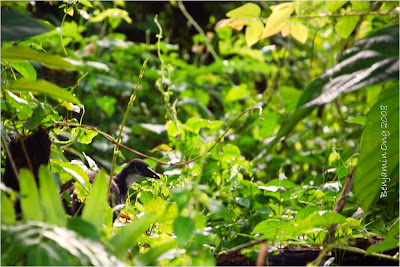
Waterhen chick. Precocial at birth (able to move freely and fend for themselves), just like chickens.

Why did the waterhen cross the road? Not that I know, except that it's really quite an amusing sight when they dash across the road on their extremely slender legs!
.jpg)
The same legs confer a notable degree of agility when it comes to navigating viny, creeper-covered terrain.
.jpg)
"Aha, I have my breakfast!"
* * * * *
Pycnonotus goiavierThe Yellow-vented Bulbul is a resident breeder in Southeast Asia from southern Thailand and Cambodia to Borneo and the Philippines.
It is found in a wide variety of open habitats, but not deep forest. It is one of the most common birds in cultivated areas. It appear to be nomadic, roaming from place to place regularly.
The Yellow-vented Bulbul builds a well-camouflaged but fragile, loose, deep, cup-shaped nest from grass, leaves, roots, vine stems, and twigs. The nest is untidy on the outside, but it is neatly lined with plant fibers. It may be built in a wide range of places from low bushes to high trees. This is a species adapted to humans and may even nest in gardens. The Yellow-vented Bulbul lays two to five eggs in February to June.
Yellow-vented Bulbuls eat berries and small fruits. They also sip nectar, nibble on young shoots, and take some insects.
(Information from http://en.wikipedia.org/wiki/Yellow-vented_Bulbul)
Maria and Mum spotted a nest in Popo's garden at the end of January. We monitored the chicks until they flew off on 21 February; we believe our 'disturbance' might have had something to do with their early departure. The chicks were already in quite good shape to fly, but they didn't seem all that ready... yet.

In contrast to chickens and waterhens, bulbul chicks are altricial, requiring intensive postnatal parental care.
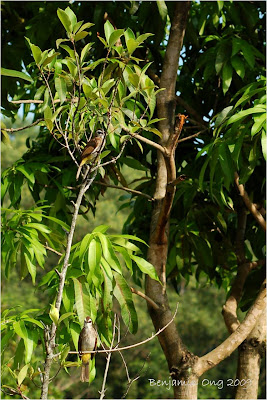
Mum and Dad; not sure which is which, though.

Bulbul with a spider in its beak.
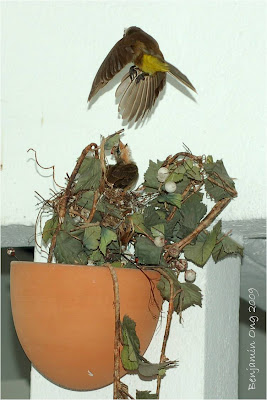
One of the parents returns... with food for the hungry chicks!
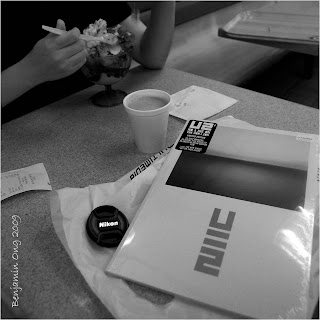
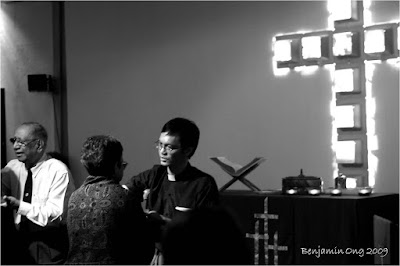



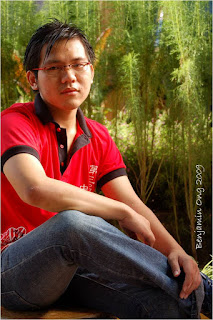
.jpg)


.jpg)
.jpg)



